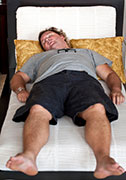- Could Your Grocery Store Meat Be Causing Recurring UTIs?
- Are You Making This Expensive Thermostat Error This Winter?
- Recognizing the Signs of Hypothyroidism
- 10 Strategies to Overcome Insomnia
- Could Artificial Sweeteners Be Aging the Brain Faster?
- Techniques for Soothing Your Nervous System
- Does the Water in Your House Smell Funny? Here’s Why
- Can a Daily Dose of Apple Cider Vinegar Actually Aid Weight Loss?
- 6 Health Beverages That Can Actually Spike Your Blood Sugar
- Treatment Options for Social Anxiety Disorder
Cutting Calories May Ease Sleep Apnea in Obese, Study Finds


Cutting calories could improve sleep apnea and lower blood pressure in obese adults, Brazilian researchers report.
Sleep apnea causes pauses in breathing while sleeping and is associated with high blood pressure, heart problems and stroke.
The study included 21 obese people, aged 20 to 55, with sleep apnea. Over a 16-week period, some reduced their calorie intake by 800 calories a day while the others made no dietary changes.
At the end of the trial, the patients who reduced their calorie intake had lost more weight, had fewer breathing pauses during sleep, had lower blood pressure and showed higher levels of oxygen in their blood, the investigators found.
The findings were to be presented Wednesday at the American Heart Association meeting on high blood pressure in San Francisco. Data and conclusions of research presented at medical meetings are typically viewed as preliminary until published in a peer-reviewed journal.
“This study suggests that in obese patients with obstructive sleep apnea, moderate energy restriction can reduce not only body fat but also the severity of obstructive sleep apnea,” study co-author Dr. Marcia Klein, adjunct professor in the department of applied nutrition at Rio de Janero State University in Brazil, said in a heart association news release.
“So moderate energy restriction in these patients has the potential to reduce cardiovascular risk,” she added.
“Losing weight was most likely the key to all the benefits observed in the calorie-restricted group. A greater reduction in systolic blood pressure can be explained, at least partially, by the reduction in body weight that was associated with reduction in obstructive sleep apnea severity and sympathetic nervous system activity,” Klein said.
Systolic blood pressure is the top number in a blood pressure reading and reflects the force of the blood in the arteries when the heart beats. Diastolic blood pressure, the bottom number in a reading, measures pressure in the arteries between heartbeats. Optimal blood pressure is below 120/80 mm Hg.
More information
The U.S. National Library of Medicine has more about sleep apnea.
Source: HealthDay
Copyright © 2026 HealthDay. All rights reserved.










